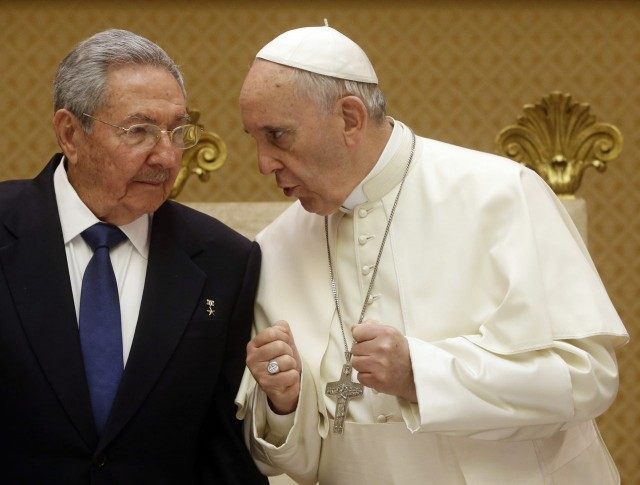In his Sunday column, political commentator George Will explains that Pope Francis is essentially a false prophet who “embodies sanctity but comes trailing clouds of sanctimony.”
“With a convert’s indiscriminate zeal, he embraces ideas impeccably fashionable, demonstrably false, and deeply reactionary,” Will writes as he excoriates Francis’ supporters for falling for media headlines that supposedly advertise the Pope’s positions on issues but rather “have the intellectual tone of fortune cookies.”
Will particularly targets Pope Francis’ concern about the environment and his apparent belief that humans cause climate change.
He cites one of the Pope’s sentiments on the topic: “People occasionally forgive, but nature never does,” and comments:
The Vatican’s majesty does not disguise the vacuity of this. Is Francis intimating that environmental damage is irreversible? He neglects what technology has accomplished regarding London’s air (see Page 1 of Dickens’ “Bleak House”) and other matters.
And the Earth is becoming “an immense pile of filth”? Hyperbole is a predictable precursor of yet another U.N. Climate Change Conference — the 21st since 1995. Fortunately, rhetorical exhibitionism increases as its effectiveness diminishes.
Will detects hypocrisy in the Vatican’s response to popular political issues, saying, “Francis lectures about our responsibilities, but neglects the duty to be as intelligent as one can be.”
“This man who says ‘the church does not presume to settle scientific questions’ proceeds as though everything about which he declaims is settled, from imperiled plankton to air conditioning being among humanity’s ‘harmful habits,’” he writes.
Will’s perspective that Pope Francis is preaching particular angles on controversial political issues about which he is not educated himself has already been observed in the area of economics.
As Breitbart News reported in July, after his frequent statements about economics, capitalism, and social justice, Pope Francis told journalists on a plane that he has a “great aversion” to economic issues because of his own personal experience as a child whose father was an accountant who brought his work home on weekends.
“I don’t understand it very well,” the Pope said about economics.
The statement led veteran Vatican journalist John Allen to note, “For a pontiff who’s made economic justice and global finance a centerpiece of his social rhetoric, it was a fairly breathtaking acknowledgment.”
Similarly, when questioned by a journalist regarding the criticism of many Americans about his seeming disapproval of the economic system in the United States, Pope Francis responded, “I have to start studying these criticisms,” a statement that suggests the Pope has not actually prepared for these intellectually weighty issues.
On the issue of the environment, Will is further drawn to the same conclusion:
He leaves the Vatican to jet around praising subsistence farming, a romance best enjoyed from 30,000 feet above the realities that such farmers yearn to escape.
The saint who is Francis’ namesake supposedly lived in sweet harmony with nature. For most of mankind, however, nature has been, and remains, scarcity, disease, and natural — note the adjective — disasters. Our flourishing requires affordable, abundant energy for the production of everything from food to pharmaceuticals.
Poverty has probably decreased more in the last two centuries than it has in the preceding three millennia because of industrialization powered by fossil fuels. Only economic growth has ever produced broad amelioration of poverty, and since growth began in the late 18th century, it has depended on such fuels.
Citing the Pope’s “fact-free flamboyance,” Will concludes Francis is drawing a “selectively reverent flock” who worships at “green altars” but disdains the Church’s doctrine on abortion, divorce, same-sex marriage, and similar tenets that essentially make the Church “Catholic.”

COMMENTS
Please let us know if you're having issues with commenting.